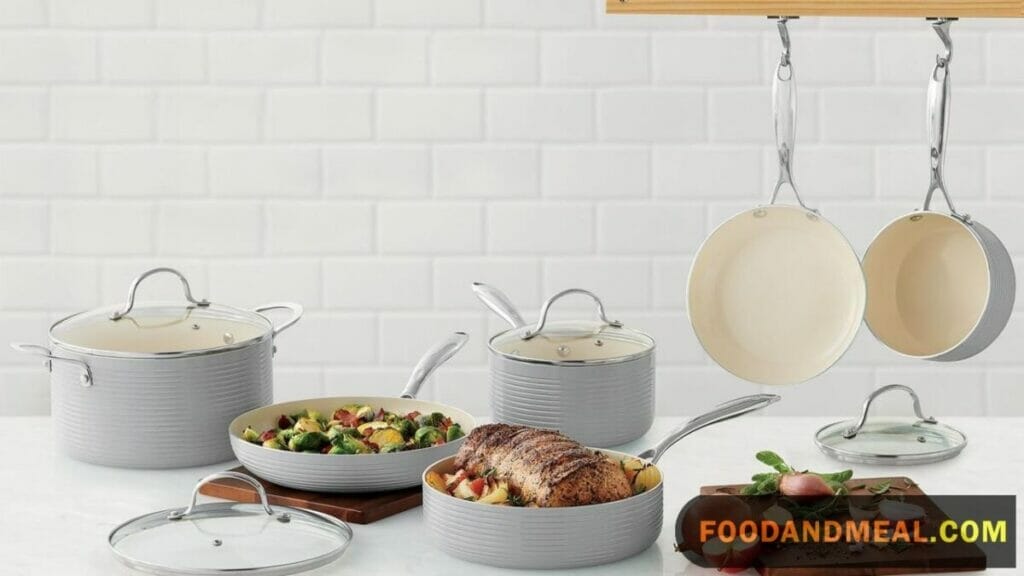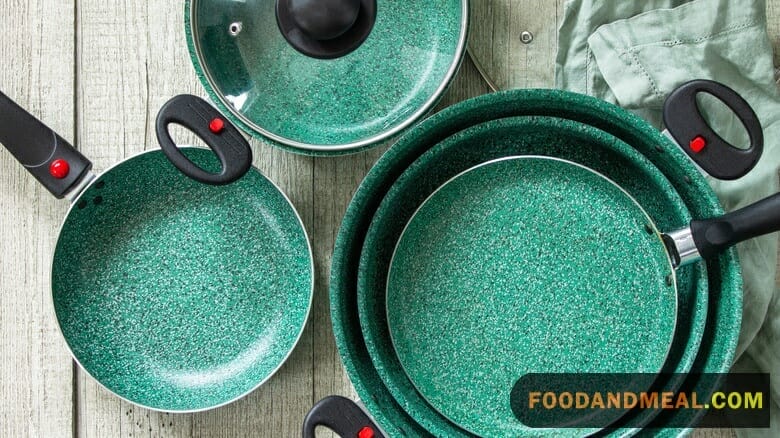If you’re looking for new nonstick cookware, you’ve likely researched which pots and pans suit your kitchen. The right cookware is crucial for your cooking style. Ceramic pots and pans are popular, especially for health-conscious cooks due to their nonstick surface and health benefits. Over time, this nonstick feature can wear off, prompting a decision between maintenance and an upgrade. So, How long do ceramic pans last? This article of Food and Meal explores ceramic cookware’s pros and cons, lifespan, and care tips.
How Long Does Ceramic Cookware Last?
In comparison to traditional nonstick materials like stainless steel and Teflon, ceramic cookware tends to have a notably shorter lifespan. On average, ceramic cookware can endure for approximately one year, while higher-quality ceramics, when maintained well, might persist for up to three years.
The primary reason for discarding ceramic cookware usually lies in the loss of its nonstick coating. Although ceramic pots and pans possess durability and resilience, improper usage can expedite the erosion of their nonstick layer. Exposing them to high temperatures, using cooking sprays, and abrasive cleaning can gradually degrade the coating.

While the decline of the nonstick layer doesn’t occur instantly, it necessitates careful handling once it does commence. Employing sharp utensils and harsh cleaning tools weakens the coating, leading to stains and food adhesion.
When you observe increased difficulty in cleaning your ceramic pans and attempts to restore the nonstick surface prove ineffective, it’s probably time to replace them. As a ceramic coating diminishes significantly, it might develop cracks and chips, mingling with your food and posing potential health risks.
Benefits of Ceramic Pots and Pans

While ceramic cookware has a shorter lifespan compared to other cooking materials, there are still compelling reasons to opt for a ceramic cookware set. Here are several key motivations for considering an investment in ceramics today.
Health-Conscious Choice
When acquiring pots and pans, the health benefits of ceramic-coated cookware make it a standout option. Ideal for health-aware chefs, ceramic cookware boasts a nonstick coating that necessitates minimal fat and oil for cooking your preferred recipes. In fact, numerous recipes require no oil at all. This not only reduces the usage of cooking oils but also maintains the lightness and low-calorie nature of your dishes.
Easy Cleaning
For many home chefs, cooking is a joyous, creative endeavor in the kitchen. However, the aftermath can be a stack of soiled pots and pans in the sink. If you’re weary of this sight, it’s time to embrace ceramic cookware. The non-stick nature of ceramic pots and pans facilitates effortless cleaning, granting you more time for culinary enjoyment and less for cleanup.
Toxin-Free
A notably secure cooking material is the nonstick skillet, a ceramic-coated pan that is devoid of the harmful toxins prevalent in many other nonstick cookware varieties. The nonstick coating on high-quality ceramic cookware comprises safe materials that won’t transfer onto your food.
Non-Reactive
A prominent attribute of ceramic pots and pans is their non-reactive nature. This signifies that you can confidently cook acidic foods without fearing harm to the nonstick coating. Unlike non-ceramic pans that might react with acidic foods, potentially altering taste and color, ceramic cookware remains unscathed. This makes ceramics a reliable choice for all types of recipes, even those with acidic components.
Versatility
Whether you’re aiming to match your kitchen’s aesthetic or seeking a distinctive hue for your new nonstick cookware, ceramic pots and pans offer versatility in style and color. While most cookware tends to be grey or black, ceramic pans are available in a spectrum of colors, ranging from vibrant orange and blue to neutral tones like tan and white.
How to Care for Ceramic Cookware

Caring for ceramic nonstick pans is essential to ensure their longevity. Follow the tips below to maintain the quality of your ceramic pans:
| Pre-use Cleaning | Wash your ceramic pans with dish soap, a soft sponge, and water before using them. This removes any dirt, debris, or oil residues. Unlike other pans, ceramic nonstick cookware doesn’t need seasoning; a quick wash suffices. |
| Moderate Heat | Cook with low to medium heat to prevent coating damage. Ceramic pans distribute heat effectively, cooking food well at lower temperatures. While they’re suitable for gas cooktops, induction cooktops are ideal. High heat can harm the nonstick coating. |
| Gentle Utensils | Avoid using sharp metal utensils or abrasive materials on ceramic pans. These can scratch and damage the nonstick coating. Opt for soft utensils like wood, plastic, or silicone to preserve the pan’s surface. |
| Avoid Food Storage | Don’t leave food in your ceramic pans for extended periods. It’s best not to use them for food storage, as this can damage the coating and create a breeding ground for bacteria due to exposure to air and temperature changes. |
Ways to Clean Ceramic Non-stick Pans
Want to prolong the lifespan of your ceramic pots and pans? Proper cleaning is key. While some ceramic cookware might be labeled as dishwasher safe, it’s recommended to hand wash whenever possible. The high temperatures and steam in dishwashers can harm ceramic pans due to their nonstick coating.
To effectively clean your ceramic cookware, follow these steps:
- Allow Cooling: Prior to washing, ensure your ceramic cookware is completely cooled down. This prevents warping or cracking when exposed to cold water.
- Use a Gentle Sponge: Opt for a soft sponge and mild dish soap to prevent scratching the surface. Avoid abrasive tools like steel wool or stiff brushes that could damage the nonstick coating.
- Remove Burnt-On Food: Though ceramic is nonstick, occasional burnt-on food can occur. Soak the cookware in hot water for 30 minutes to an hour to help remove stubborn residues.
- Clean Sides and Bottom: Don’t overlook the sides and bottom of the pan. Neglected grease and food remnants can lead to discoloration and compromise the nonstick coating.
When considering new ceramic cookware, weigh its pros and cons. Ultimately, your cooking style and usage frequency will determine the best choice for you. If you seek nonstick and health-conscious options, ceramic pots and pans are a valuable addition to your kitchen, potentially adding a vibrant touch as well!
FAQs about Ceramic Cookware
- Q: How durable is ceramic cookware?
A: Ceramic cookware is known for its durability. With proper care and usage, it can last for many years.
- Q: What factors contribute to the lifespan of ceramic cookware?
A: The lifespan depends on factors like the quality of the ceramic, how well it’s cared for, and the cooking methods used. Avoiding extreme temperature changes and using non-metal utensils can extend its life.
- Q: Can I use ceramic cookware on high heat?
A: Most ceramic cookware is safe for medium to high heat. However, sudden temperature changes can lead to cracking. Follow the manufacturer’s guidelines for recommended heat levels.
- Q: Is ceramic cookware dishwasher-safe?
A: Many ceramic cookware pieces are dishwasher-safe, but handwashing is often recommended to preserve their appearance and longevity. Check the manufacturer’s instructions for specific care guidelines.
- Q: Can I use metal utensils with ceramic cookware?
A: It’s advisable to use non-metal utensils, such as silicone or wooden, to prevent scratching the ceramic surface. Metal utensils can damage the non-stick coating over time.
- Q: Does the type of stove affect the lifespan of ceramic cookware?
A: Ceramic cookware is compatible with most stovetops, including gas, electric, and glass-ceramic. However, using it on an induction stove requires specific compatibility, so check for induction-ready markings.
- Q: How should I clean ceramic cookware to prolong its life?
A: Handwashing with a soft sponge or cloth is recommended. Avoid abrasive cleaners and steel wool, as they can damage the ceramic surface. Let the cookware cool before washing.
- Q: Can I continue using ceramic cookware if it has minor scratches or chips?
A: Minor scratches may not significantly impact performance, but deep scratches or chips can compromise the non-stick surface. It’s best to replace damaged ceramic cookware to ensure safe and effective cooking.
- Q: Does the frequency of cooking affect the lifespan of ceramic cookware?
A: Regular use is generally beneficial for ceramic cookware, but excessive overheating or prolonged high heat exposure may shorten its lifespan. Follow recommended cooking temperatures and avoid empty cooking.
- Q: Can ceramic cookware be used in the oven?
A: Many ceramic cookware pieces are oven-safe up to a certain temperature. Check the manufacturer’s guidelines for specific oven safety information and temperature limits.

25 December ·
The Lifespan of Ceramic Cookware: Myths and Facts
By Food And Meal
Welcome back to "Kitchen Chronicles," your go-to podcast for all things cooking! I'm Jenny, and today we're diving into a topic that many home chefs are curious about: the lifespan of ceramic cookware. So, let's explore how long you can expect your ceramic pots and pans to last and discover the benefits they bring to your culinary journey.

